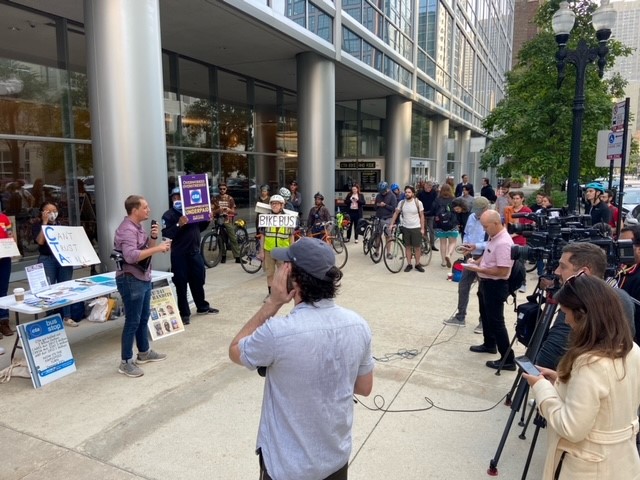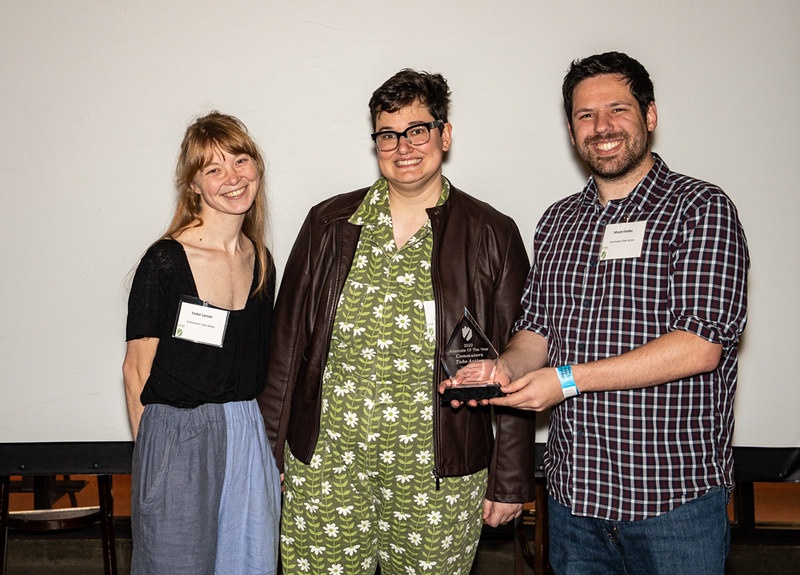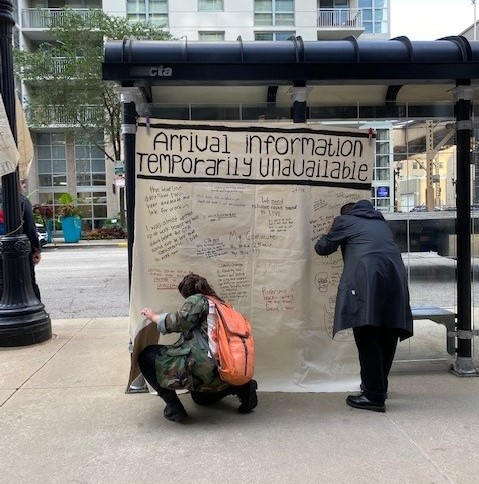Commuters Take Action has only been around since April 2022. But in that short period of time, the resident-led advocacy organization has made a name for itself, representing a movement of frustrated commuters fed up with the slow and unreliable service of the Chicago Transit Authority’s buses and trains.
Micah Fiedler, Olivia Gahan and Fabio Göttlicher co-founded Commuters Take Action after experiencing long waits and service gaps during their own commutes on the CTA’s buses and trains.
Active Transportation Alliance recently recognized the vital work that the trio is doing by honoring them with an Advocate of the Year award at our recent annual member meeting. We specifically wanted to recognize their effort to cast spotlight on the problem of Chicago’s ghost buses through effective organizing, rallies, and data analysis.
With no community organizing or advocacy experience, Fiedler (a software tester), Göttlicher (a software engineer) and Gahan (a project manager) created the advocacy group to draw attention to the CTA’s service problems and put pressure on the agency to improve the transit experience.
REASONABLE DEMANDS
The organization is demanding that the CTA fix the bus and train trackers so that they accurately reflect the transit schedules and don’t include ghost buses and trains—a problem that has plagued the CTA since the height of the pandemic.
“It’s been two years, and they still haven’t been able to provide accurate schedules,” Göttlicher says. “CTA really needs to go back to their drawing board and change the way they design their schedules to be more data driven based on their staff availability and the software packages that power the trackers.”
Commuters Take Action is also demanding that the CTA be transparent about its hiring and retention policies. CTA is dealing with a significant staffing shortage that is contributing to service delays.
The agency needs to provide higher wages and safe working conditions to recruit and retain bus and train operators, Commuters Take Action says.
“Operators are constantly under stress, and they can be under threat,” says Fiedler. “I like to say that an operator on a bus is pilot, flight attendant, and security marshal. They have three positions for that on a plane, but an operator can be working with as many people as a small jet. So these people are working under insane amounts of stress. And it’s not just that they aren’t being compensated enough, although they definitely aren’t, it’s that they aren’t being given the support.”
Commuters Take Action also wants the CTA to create a plan that returns bus and train service to pre-pandemic levels. According to data analyzed by Commuters Take Action, only about 60 percent to 70 percent of buses and trains arrive as promised. Commuters Take Action says that the CTA has conceded only 77 percent of CTA trains arrive on time.
“It seems like over the past two years the CTA has been operating under a crisis management model instead of taking any time to do future planning,” Fiedler says. “We think that this is a leadership issue, where they will not provide a return-to-service plan because they haven’t put in the work and done future projections and future planning for return to service.”

SHARED EXPERIENCES
To pressure the CTA into offering better service, Commuters Take Action collects data and anecdotes about late or no-show buses and trains from residents who submit their experiences to the Commuters Take Action website.
“The big idea behind the public data collection is to have actual stories from actual commuters,” says Gahan.
The group then presents that information to the CTA at its board meetings every month. They emphasize how these service delays and cancellations disrupt residents’ lives, including being late for work, carrying heavy grocery bags home, spending money on cabs or ride-sharing services, and medically compromised riders waiting for long periods in cold or hot weather—putting their health at risk.
Göttlicher says the CTA board, which oversees the agency, seems to lack direct experience with the day-to-day challenges of CTA riders. “There hasn’t been any critique on the CTA coming from the board, which I think is alarming,” says Göttlicher. “The board is there to check on the president and the CTA to make sure they’re delivering what they promised. And the board has been very lackluster.”
MAJOR ACHIEVEMENTS
Despite the CTA’s lack of urgency and acknowledgement of its service discrepancies, Commuters Take Action has played an important role in some major wins in its fight for better transit service.
While the organization was pleased when the CTA unveiled a new action plan to improve reliability, safety, and customer experience in August, Commuters Take Action wants the plan to outline clear metrics to measure success and an independent third-party agency to oversee and evaluate how the CTA carries out the plan rather than the CTA auditing itself.
Commuters Take Action was instrumental in helping to craft legislation that 40th Ward Ald. Andre Vasquez introduced in the Chicago City Council that requires CTA officials to meet with the council’s Committee on Transportation and Public Way quarterly to discuss service levels, operations and security. The ordinance also requires Carter to show up to these hearings if the alderpersons deem that necessary.
Commuters Take Action and other advocates believe the City Council will pass the ordinance.

Commuters Take Action is also proud of the protest it held on Sept. 14 in front of CTA headquarters to spotlight the CTA’s service delays and gaps. About 50 people showed up chanting, “No more ghosts,” referring to buses and trains that appear on the trackers and apps, but never show up. They also shared their complaints about long waits for buses and trains as well as security issues and staffing shortages.
Even though Commuters Take Action is only less than a year old, the organization says it is not surprised it has been able to build the support necessary to score these three major victories this year. It credits the organization’s nimbleness and willingness to collaborate with elected officials, transit advocates, and Chicago residents for why Commuters Take Action has grown so quickly this year in members and reputation.
“I think a lot of us just come from a place of being really frustrated riders,” Göttlicher says. “Transit affects everyone.”
“Transit builds community,” Fiedler says. “Chicago’s an amazing commuter city, but it’s also an amazing community city. And that’s only possible if people are able to get not only within their sphere to the things that they need to go to, but also to join up with other people and to really knit the city together. If they can’t do that, well, we don’t have a city.”
________________________________________
Top two photos, courtesy of Commuters Take Action, show the protest outside of CTA headquarters on Sept. 14, 2022. Bottom photo shows Commuters Take Action accepting their Advocate of the Year Award at the 2022 Active Transportation Alliance member meeting.
With support from people like you, Active Transportation Alliance works to make our transportation options safer, more sustainable, and more equitable. You can be part of the movement by joining Active Transportation Alliance, renewing your membership, or donating today.

